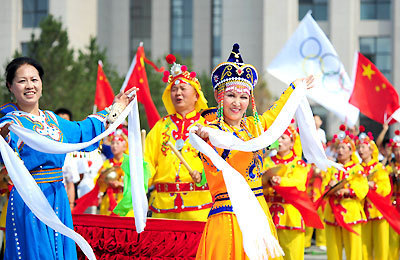HOHHOT: Torchbearers and spectators tried various means to showcase their ethnic Mongolian culture , when the Olympic torch passed through the capital of the Inner Mongolia autonomous region on July 8, 2008.
Torchbearer Wang Liping, a performing artist, mimicked the act of horse riding during his run, while wrestler Shanamu Gerile wore a wrestler's hat in a bid to remind people of the Mongolian tradition.
 |
|
Local residents put on performances featuring traditional Chinese musical instruments and dress welcome the Olympic torch on July 8, 2008. [Xinhua]
|
Among the tens of thousands of spectators were herdsmen from the surrounding grasslands dressed in their finest costumes, or white T-shirt with black spots mimicking their milking cows, or on horseback.
Home to 4.23 million ethnic Mongolian people, Inner Monglia is the last ethnic autonomous region to host the Olympic torch relay.
Fifty-four Mongolian torchbearers participated in yesterday's run, with 49 others running today and tomorrow in Ordos, Baotou and Chifeng.
"As an ethnic Mongolian, I am really proud to carry the torch in my hometown," Mengke Bateer, the only Chinese basketball player to have ever won the NBA championship, said.
Bateer led off the relay from the square in front of the three-story Inner Mongolian Museum, home to a number of exhibition halls showcasing the history of the Mongolian people, the best known being Genghis Khan.
Pan Gang, chairman and president of dairy goods producer Yili Group, lit the cauldron to conclude the relay.
Traditionally known as "the people on horseback", the Mongolians are proud of their milk production, which accounts for almost half of China's total.
Hohhot, home to two of China's leading diary groups, Yili and Mengniu, is also known as "the diary capital of China".
The Mongolians are also proud of their traditions, such as Nadam, which means entertainment in Mongol, but is in fact a traditional mass meeting and an annual gala of the Mongolian with a history dating back to 1225, when Genghis Khan beat Hualamo. In order to celebrate his success, a grand Nadam was held. Initially Nadam was an occasion to showcase Mongolian's age-old "Three Manly Skills", namely boke (Mongol for wrestling), horsemanship and archery.
"The Olympic Games for the people across the world is like nadamu for us Mongolians," Gerile, a local wrestling hero who made his name first through Nadam, said.
"It is an opportunity for exchange and competition."
Gerile became a professional wrestler in 1990, and soon gained national fame after winning several titles.
However, he has never competed in the Olympics, as China has never been good at the sport. But Gerile hopes one day the country will compete. "I am looking forward to the day when one of my students is an Olympic champion," Gerile, coach of the women's regional wrestling team, said.